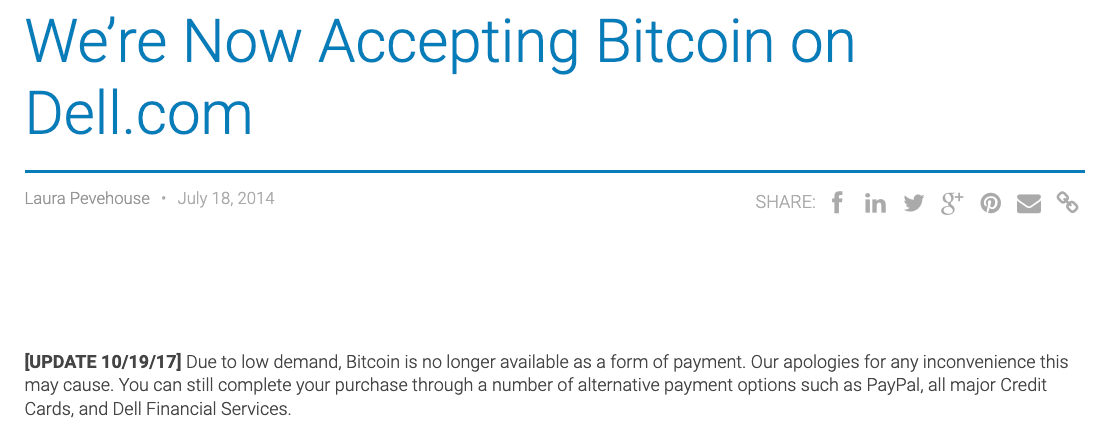- Supply Shock
- Posts
- 📕 Catch-21
📕 Catch-21
Widespread merchant adoption might be decades away

Let’s say Satoshi still has the keys to all their estimated bitcoin.
Nakamoto would’ve just flipped Bill Gates and Michael Dell to become the 11th-richest billionaire on both Forbes and Bloomberg, worth over $133 billion on the BTC holdings alone.
Today’s historical reel pull is then very fitting.

Eleven years ago exactly, Dell announced that it would begin accepting bitcoin from US consumers and small businesses.
Dell was by far the largest company to adopt bitcoin payments to date. Supply Shock’s own Pete Rizzo reported that the PC giant was “roughly 4x the size of DISH Network — the previous biggest bitcoin-accepting business,” with annual revenues of close to $57 billion.
To sweeten the deal, Dell offered a 10% discount on all Alienware products bought with bitcoin. The move made worldwide headlines and capped off a series of similar stories featuring DISH, Newegg.com, Overstock, Expedia and 1-800-FLOWERS.
Overstock was arguably the most impressive despite lower revenues. The e-commerce firm kept 10% of any bitcoin it earned and sold the rest, whereas most others simply sold it all. Overstock later pledged to direct 3% of bitcoin profits toward bitcoin advocacy organizations to help boost merchant adoption.
Dell is now the world's largest ecommerce business to accept #bitcoindell.comfb.me/1d9ojMrZw
— Michael Dell 🇺🇸 (@MichaelDell)
3:52 PM • Jul 18, 2014
It was Coinbase that approached Dell about a partnership a few months prior to the announcement and moved quickly, in a matter of weeks, once a decision was made.
“We put this together quickly as a result of listening to our customers,” a Dell spokesman told the New York Times. “It’s another way for customers to have a relationship with Dell.”
Dell never disclosed how much of its revenue came from bitcoin sales. Still, four weeks after the announcement, the CEO tweeted that Dell had received a PowerEdge server order worth more than 85 BTC — worth $50,000 at the time but more than $10 million today. Dell later stopped accepting bitcoin in 2017 due to low demand for the payment option.
This is precisely the kicker. Bitcoin is undoubtedly money, better money, even, but few people really want to spend their bitcoin. Those which rolled out bitcoin payment options in the mid-2010s did so specifically for use within the online payments context, as if it were just another payments technology like PayPal or credit cards.
It bears repeating that at the granular level, these companies never really accepted bitcoin to begin with. They accepted US dollars and lent on third-party payment processors like Coinbase and BitPay to turn any incoming bitcoin into cash.
Does it matter? Well, not if you believe that the buzz of the likes of Dell, Microsoft, Expedia and Time adopting bitcoin would move the needle.
It’s hard to draw a direct line, however, considering bitcoin would be in a bear market for the two and half years that followed Dell’s announcement. But that’s not to say these types of partnerships couldn’t plant a million seeds that bloomed into the monster 2017 bull run.

Oh.
If you were to ask why retailers opted to dump their customers’ bitcoin rather than hold it, the answer would be a mix of regulatory worries or concerns about bitcoin’s volatility.
At the same time, picture a bitcoin-ified world where, perhaps, half of all global e-commerce activity is conducted in bitcoin and sold immediately for fiat by a payment processor. Suddenly, there would be an extra ~$6 billion in downward pressure on bitcoin prices every single day, and more on consumer holidays like Black Friday and Christmas.
It’s easy to see how that might put a dampener on bitcoin’s so-called volatility “problem,” bringing it closer to something that resembles equilibrium. Which, in turn, might help people actually spend their bitcoin, boosting merchant adoption significantly and bringing the global economy closer to running on Bitcoin rails (imagine the fees that would go to miners, perhaps even enough to replace revenue lost to halvings).
A nice dream. But in reality, we’re stuck in a Catch-22 — bitcoin is too lucrative to hold and the opportunity cost of spending it is too high, resulting in the explosion in corporate treasury initiatives instead.
Bitcoin may never see a wave of adoption from online retailers like we did a decade ago. At least, not until the market is officially done with price discovery.
Let’s see how the playing field looks in another few decades.
— David
Give us the one thing more valuable than BTC: your opinion.
We’ve put together a quick form to help us get to know you and understand what matters most — what you want more of, less of, and whether our content is hitting or missing the mark.
And, if you complete the survey, you'll get entered for a chance to win some bitcoin merch to show off your love of BTC this summer.

Dell rejected a shareholder proposal to add bitcoin to its balance sheet in May this year. BTC is up 17% since then.
BTC/USD is facing resistance around $120,600, bouncing off that level twice in the past 12 hours.
ICYMI: Trump is expected to allow pension funds to hold alternative assets, including bitcoin, with an executive order.
